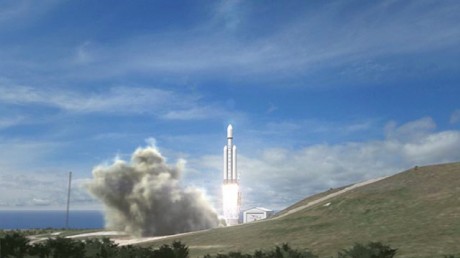SpaceX Signs Up First Customer for World’s Most Powerful Rocket
Posted by Andrew on May 30th, 2012
SpaceX and Intellisat, the world’s largest provider of satellite services, have issued a press release announcing that Intellisat has signed up to be the first customer for SpaceX’s next generation rocket, the Falcon Heavy. The most powerful rocket in the world (capable of delivering 117,000 pounds to low earth orbit) and the largest since the Saturn V rockets, the Falcon Heavy is expected to take flight next year.
The previous attempt at trying to build the world’s most powerful rocket was the Soviet Union’s Energia. On its first mission the rocket failed to get the payload to orbit. The second, carrying the Soviet Space Shuttle variation, the Buran, reached orbit, but actual payload capacity was a third less than the Falcon Heavy’s planned capacity.
Consisting of three modified Falcon 9 cores, the Falcon Heavy involves an innovative fuel strategy that’s never been attempted before in this kind of rocket. As the rocket gains altitude, the two outer cores will fuel the main core’s engines, so when separation occurs, the primary stage will be fully fueled and carrying no dead-weight.
Based upon proven Falcon 9 technology, the Falcon Heavy brings about radically lower launch costs of approximately $1,000 per pound, where previous cost to low earth orbit (LEO) was around $10,000 and as much as $30,000 onboard the Space Shuttle when you factor in the total program cost.
SpaceX founder Elon Musk has said a manned lunar mission on the scale of the Apollo would be capable with two launches using the Falcon Heavy. SpaceX has also proposed using a Falcon Heavy and a modified Dragon capsule to perform an unmanned Mars mission called Red Dragon, for about $450 million – oddly enough the budget and marketing cost of the film John Carter (of Mars).
While SpaceX is preparing the Falcon Heavy, engineers and scientists at their McGregor, Texas test facility will continue developing the technology for their long range plan of making a full reusable Falcon Heavy rocket by the end of this decade. Accomplishing this could bring launch costs to under $10 per pound. For more on the impact of that, check out our article Space Boom.
Andrew Mayne is a science fiction and thriller author. His website can be found at AndrewMayneBooks.com
May 31st, 2012 at 5:39 am
hey, NewScientist says in a book called ‘Rainy Brain, Sunny Brain’, you can retrain your brain for a more positive outlook. Let me try. Hey, look at SpaceX’s PICA-X heat shielding tests. It can withstand twice the heat of lava and is a little denser than balsa wood:
http://www.space.com/15920-spacex-heat-shield-tested-3-500-degrees-fahrenheit-video.html
June 2nd, 2012 at 7:39 am
Looks like SpaceX is going after another customer, a big one…the United States military.
Space News:
“….”SpaceX has done very well in terms of winning customers in all markets,” SpaceX Chief Executive Elon Musk told Space News. “The one market that we have not yet been successful with is launching Defense Department satellites, although we’re hopeful that we’ll win one or two demonstration launches this year and then we look forward to serving the needs of the Defense Department in terms of launching satellites on the main contract as soon as possible…”
“…..“In order for a fair competition, a new entrant would need to support the full set of mission and technical requirements. In addition, entrants also will be faced with stringent government oversight, accounting and reporting requirements — none of which is part of a commercial business plan,” ULA spokeswoman Jessica Rye wrote in an email toSpace News.
“With 60 successful launches in just over five years, we are confident ULA’s proven system solutions will compete with any offering on level playing field. ULA also understands that the issue is not about competition, but how can our customers enable the reliable delivery of important space capabilities that protect our nation and promote science at the most cost efficient method,” Rye said…..”
so the battle begins.
June 2nd, 2012 at 4:46 pm
ULA is a conglomeration of Lockheed and Boeing. They’ve attempted to use their influence within the government to make it harder for SpaceX at every turn. In my humble opinion, they represent the problematic nature of no-bid contracts and boondoggle politics in agencies like Defense and NASA.